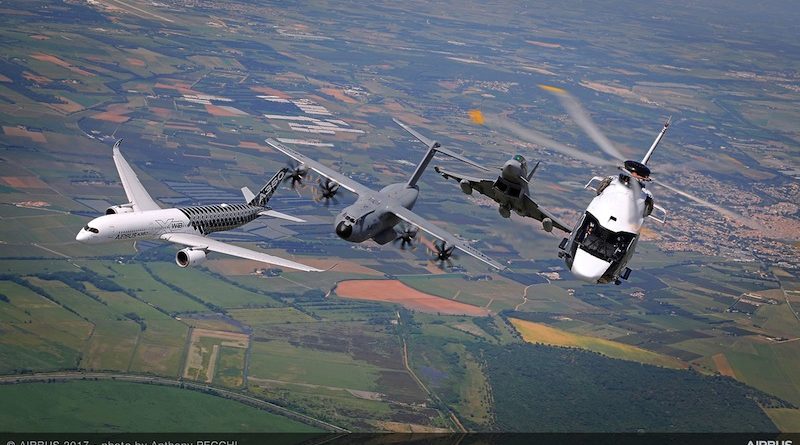
Ensuring European leadership in strategic industries
In 2019, Airbus is turning 50 years old. In the late 1960s, an ambition to challenge the monopoly at the time inspired a new, simple, yet bold idea: the industrial collaboration between 4 European countries.
Today, the Aeronautics, space and defence are sectors of excellence of the European economy with global leadership across the globe.
In 2017 alone, they were a key driver of economic development, representing €220.2Bn of total turnover, more than 860 000 direct jobs and provided a positive contribution to the EU trade balance (€30Bn in EU exports).
Airbus figures prominently in these numbers as a leading European Aerospace & Defence company.
These impressive figures should not hide the fact that our sector is at a turning point in its history. The truth is our future is more and more uncertain at a time we are facing multiple challenges, with global trends (climate change, migration, technological disruption transforming industry), as well as an evolving competitive landscape.
Our industry is an area of strategic competition: numerous countries have developed and implemented far reaching strategies on how to position their countries to secure a top position in the global value chain, especially in our sector.
Looking at the increased amount of events and articles that have seen the light in the last months, including unilateral tariffs on European aircraft products, the desperate need to ensure a level playing field for European strategic industries is more prominent than ever.
With this context in mind, there is no other answer for the EU than launching a robust and consolidated Industrial Strategy for Europe with a strong execution phase for our continent to deliver on jobs, growth, and most importantly competitiveness in this new era taking shape in front of us.
Our common duty is to make sure that the European industry will remain competitive globally and at the forefront of fast-changing technological developments.
The transversal dimension must be core, but a sectorial approach encompassing industries of strategic interest to Europe must also be included. This is all the more important so that our sector contributes in its three components Aeronautics, Defence and Space to the strategic autonomy of Europe in many dimensions: civil-military cross-fertilization, defence & security independence, access to space to name a few.
How can we work together to shape the future of the European industry looking forward and what should we focus on?
Leveraging civil and military synergies
The blurring line between civil and military will only increase with the ongoing technological revolution.
In our company, at a time we rethink the way we design and build aircraft, integration of existing innovation from our defence business is an integrated part of our strategic reflection.
The other way, our defence & space business will benefit from innovations in the commercial realm, ultimately contributing to defining strategic autonomy for Europe. Our sector would benefit from an optimized governance and administrative support to optimize the use of all the EU programs and financial instruments specifically dedicated to the Aerospace, Defence & Security sector.
Levelling the playing field
The competitive landscape of aerospace & defence is hardening. Protectionism policies across the world arise at an unprecedented speed and the original “business as usual” approach which prevailed for our sector is no longer sustainable.
European companies are gradually facing major superpowers and are not equipped to compete fairly. In such a complex geopolitical environment, the EU needs to continue promoting free trade and multilateralism. But it must also take decisive actions stemming unfair practices of third countries to defend European companies, with new and innovative trade instruments.
Levelling the playing fields with great powers also requires the EU and Member States to re-think their diplomacy. FTA negotiations and bilateral external visits should be used to help key European companies with economic diplomacy (provided there is no intra- European competition) to break into international markets.
Supporting game changer Research & Development in strategic areas
R&I in Aerospace & defence are fundamental to drive the development of products that will secure the EU’s high-technology intensity and military strength for the future and keep Europe competitive on the global market.
Large European Public-Private Partnerships, especially Clean Sky and SESAR Joint Tech- nology Initiatives, have provided best practice collaborate tools to federate the whole European innovation chain around common objectives and deliver successful demonstrators of disruptive climate-friendly technologies.
Now insufficient levels of investments in R&I in Europe and a lack of agility to win the innovation race endanger Europe’s position as a global industrial champion and in the long run its mere strategic autonomy.
In the light of rapidly evolving technologies with a huge impact on the economy and society as a, financial support to both sectorial and cross-cutting R&I should be a priority for the EU.
With this support Airbus is committed to deliver safer, cleaner and affordable products to answer increasing needs contributing to European economy and society.
Investing in breakthrough innovation for the industrial internet to become reality
An extraordinary technological revolution has begun and will profoundly transform the European industry, regardless of the sector.
Traditional leaders in Aerospace & Defence shall be at the forefront of this digital revolution, lead on new business models, and new mobility concepts; and drive the implementation of new transversal technologies (i.e. artificial intelligence, virtual reality, robots, etc.) into the sector.
A “new golden age of industrial internet” will make the world a more competitive place for all of us, and for our supply chain, which needs to transform at the same speed.
Hence all the challenges facing the industry must be addressed in a holistic manner and require a strong response from all stakeholders public and private sector hand in hand in Europe, up to the challenges.
We must build a full and precise view of policies and support measures to consider what should be done at the EU level, and to explore together the most critical industry applications of digital technologies, where we can create the highest added-value for the EU and keep European businesses ahead of the curve.
By acting in a coordinated way among the public and private sector, and focused way as a whole, Europe can use its existing assets to play a role in the area of traditional industries that improves Europe’s economic weight, in line with European values.
The more we stand together, the more competitive we will be.
Europe has all it takes to be able to harness opportunities brought by its strong industrial base. All it needs is a wake-up call for its industrial ambition.




